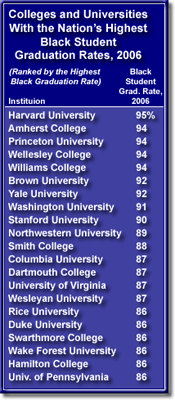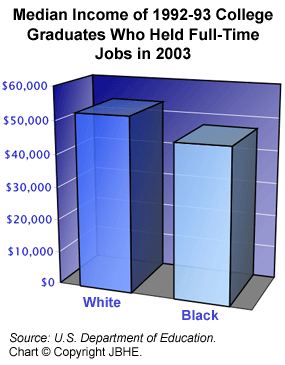Colleges and Universities With the Highest Black Student Graduation Rates
 New data from the Department of Education shows that there are nine colleges and universities in the United States with a black student graduation rate of 90 percent or higher. New data from the Department of Education shows that there are nine colleges and universities in the United States with a black student graduation rate of 90 percent or higher.
As has been the case in the recent past, Harvard University has the highest black graduation rate at 95 percent. But four colleges and universities are right on Harvard’s heels with a black student graduation rate of 94 percent. They are Amherst College, Williams College, Wellesley College, and Princeton University.
Brown University, Yale University, Washington University, and Stanford University all produce black graduation rates of at least 90 percent.
There are 12 other colleges and universities at which the black student graduation rate is 86 percent or better. They include: Northwestern University, Smith College, Columbia University, Rice University, Hamilton College, Dartmouth College, the University of Virginia, and Wesleyan University. Also posting black graduation rates of 86 percent or better are Duke University, Swarthmore College, Wake Forest University, Hamilton College, and the University of Pennsylvania.

  |
“We will never truly achieve equality in higher education until all students excel and graduate at similar rates.”
— W. Robert Connor, president of the Teagle Foundation, announcing the publication of a report on how colleges and universities can boost college completion rates of blacks and other minorities (See story below.)
|
Black Enrollments at Penn State Are Increasing, But Gains Are Slow
 In addition to the main campus near State College, there are 21 satellite campuses of Pennsylvania State University spread throughout the commonwealth. All told, these campuses enroll about 85,000 students. There are more than 4,500 black students enrolled at these campuses. They make up 5.4 percent of all enrollments systemwide. In addition to the main campus near State College, there are 21 satellite campuses of Pennsylvania State University spread throughout the commonwealth. All told, these campuses enroll about 85,000 students. There are more than 4,500 black students enrolled at these campuses. They make up 5.4 percent of all enrollments systemwide.
The university reports that black enrollments systemwide have increased every year for the past 10 years. This year there are 442 more black students than there were in 2005.
At the flagship campus in University Park in the rural central part of the state, blacks make up 4 percent of the nearly 35,000 undergraduate students. The percentage of blacks on this main Penn State campus has inched up slowly in recent years.
It must be remembered that blacks are about 10 percent of the population in Pennsylvania. Therefore, the percentage of blacks on the main campus of Penn State is less than one half of what would exist if racial parity in enrollments were to prevail.


University of Wyoming

Wyoming Excellence in Higher Education Endowed Chair in Literacy Education
Seeking a dynamic leader with a well-established record of research including a history of extramural funding. This endowed chair will provide leadership in building the College of Education's focus on language and literacy education. Candidates' research agenda should be relevant to PK-16 education and demonstrate knowledge of cognition and student learning. The chair will be asked to provide leadership to the literacy education programs of the College and to create a nationally recognized program in language and literacy education. This program will be designed to produce the next generation of leaders in the fields of language and literacy. Teaching courses in the candidate's areas of expertise on campus and through outreach with Wyoming educators is expected. We seek an innovative person with an earned doctorate in literacy education who will work collaboratively with faculty and departments across campus as well as with the public schools. Applications should include a letter stating research and teaching interests and accomplishments, a curriculum vitae, and the names and contact information for five professional references who can attest to the candidate's record of excellence in scholarly research and publication, excellence in teaching, and ability to acquire and manage external funding should be mailed directly to the search committee chair at the address listed below. Send an electronic copy of the application materials to Ms. Debra Dobbyn at ddobbyn@uwyo.edu. Additional materials can be sent directly to Dr. Barbara Chatton, Search Committee Chair, Dept. 3374, 1000 E. University Ave., Laramie, WY 82071; bchat@uwyo.edu; 307-766-5772.
The University of Wyoming is an Affirmative Action, Equal Opportunity employer.

Historically Black Langston University Seeks to Become More Racially Diverse
 Langston University is the only historically black college or university in the state of Oklahoma. Currently, there are about 3,000 undergraduate students at the university and the vast majority of those students are black. Langston University is the only historically black college or university in the state of Oklahoma. Currently, there are about 3,000 undergraduate students at the university and the vast majority of those students are black.
But Langston University is aiming to increase enrollments by 67 percent over the next 10 years. And a foundation of its 10-year plan is to increase the number of Hispanic and American Indian students at the school. The university is planning to hire recruiters whose sole responsibility will be to reach out to these two minority groups.
Blacks, Hispanics, and American Indians are each about 8 percent of the population in the state of Oklahoma.

Black College in Maryland Saved by State’s Highest Court
 In 2003 Sojourner-Douglass College of Baltimore set up a satellite campus in a rural area of Anne Arundel County. More than 98 percent of students at the college are black. In 2003 Sojourner-Douglass College of Baltimore set up a satellite campus in a rural area of Anne Arundel County. More than 98 percent of students at the college are black.
The six-acre lot where the new campus was situated had a restrictive covenant which stipulated that the land could be used only “for educational facilities in conjunction with the Anne Arundel County Board of Education.” In short, the land was set aside as a future site for a public school, not a college or a university.
A local homeowners association filed suit against the college. Officials at the college maintained that racism was the motivation behind the lawsuit but local homeowners said merely that they objected to the increased traffic generated by the commuter college. A local court ruled in favor of the Sojourner-Douglass College but an appeals court said that the college’s building violated the restricted covenant and would have to be removed.
Now the Maryland Court of Appeals has overturned that decision and the college will be permitted to maintain its satellite campus. The court said that the local school board’s plan to utilize the space from time to time and the fact that students at the college could serve as student teachers in the local public schools were enough to satisfy the restrictive covenant.

Several Black Scholars Earn Promotions at Yale University
Yale University has announced the following promotions of black scholars:
• Elizabeth Alexander was appointed professor of African-American studies. She was an adjunct associate professor in the department. The author of four books on poetry, her 2005 title, American Sublime, was one of three finalists for the Pulitzer Prize.
 • Ruth E. Blake was promoted to associate professor of geology and geophysics. A graduate of Wayne State University, she holds a master’s degree in hydrogeology from the University of Texas and a Ph.D. in geochemistry from the University of Michigan. • Ruth E. Blake was promoted to associate professor of geology and geophysics. A graduate of Wayne State University, she holds a master’s degree in hydrogeology from the University of Texas and a Ph.D. in geochemistry from the University of Michigan.
 • Miriam E. Delphin was promoted to assistant professor and director of health services research and evaluation at Yale Medical School. She was an assistant clinical professor in the department of psychiatry. She is a graduate of Hofstra University and holds a master’s degree and a Ph.D. in psychology from Purdue University. • Miriam E. Delphin was promoted to assistant professor and director of health services research and evaluation at Yale Medical School. She was an assistant clinical professor in the department of psychiatry. She is a graduate of Hofstra University and holds a master’s degree and a Ph.D. in psychology from Purdue University.
• Marsha Guess was appointed assistant professor of obstetrics and gynecology at the Yale Medical School. She was a clinical research training program scholar at the school. Guess is a medical doctor trained at UCLA.
• Michael E. Veal was promoted from assistant professor to associate professor of music with a joint appointment in the department of African-American studies. A graduate of Berklee College of Music, Veal holds a master’s degree and a Ph.D. in ethnomusicology from Wesleyan University.

  |
20.4% Percentage of all 18- to 24-year-old African Americans who were enrolled in college in 1984.
31.8% Percentage of all 18- to 24-year-old African Americans who were enrolled in college in 2004.
source: U.S. Census Bureau
|
California Community Colleges Graduate Only a Small Percentage of Their Black Students and Few Blacks Transfer to Four-Year Institutions
 The California Community College system is the largest higher education system in the world. It enrolls more than 2.5 million students at 110 different campuses. Blacks make up about 8 percent of the total enrollments at California community colleges. The California Community College system is the largest higher education system in the world. It enrolls more than 2.5 million students at 110 different campuses. Blacks make up about 8 percent of the total enrollments at California community colleges.
About half of all students who enroll in community college enroll in academic programs leading to a two-year associate’s degree, which would enable them to transfer to a four-year program at a campus of the University of California or California State University.
But a new report from the Public Policy Institute of California finds that less than half of these students complete more than one year of community college work. Only 6 percent of students persist to earn a two-year associate’s degree and about 15 percent transfer to a four-year college. The study found that for recent black high school graduates who entered a community college, only 19 percent went on to transfer to a four-year college. For Asian-American recent high school graduates who enrolled in community college, 41 percent eventually transferred to four-year institutions. For whites, the figure is 30 percent. Only 6 percent of blacks earned a two-year associate’s degree compared to 11 percent of whites.


Purdue University

Three to Six New Faculty Positions
Innovations In P–12 sTEm Education
College of Education
College of Engineering
College of Technology
POSITIONS AVAILABLE: Applications are invited for 3-6 full-time, open rank, tenure-track faculty positions to develop the Innovations in P-12 sTEm Education Initiative. Our collaboration is aimed at attracting faculty who can provide leadership in developing research-based, pedagogically valid strategies for effective interventions that guide P-20 engineering and technology pathways. For a more detailed description, see http://www.education.purdue.edu/about/employment.html.
POSITION RESPONSIBILITIES: These positions will be 10-month, tenure-track positions and candidates must have an earned doctorate in a related field. Successful candidates will build collaborative relationships with colleagues in the P-12 sTEm cluster and related disciplines, conduct and publish research, secure funding for their research program, teach graduate and undergraduate courses in their areas of expertise, recruit and advise graduate students, and lead P-12 engagement efforts.
PURDUE UNIVERSITY: Purdue University ranks among the 15 largest universities in the nation. Over the past six years, the university has raised approximately $1.5 billion and added 300 new faculty positions in support of an ambitious strategic plan (http://www.purdue.edu/strategic_plan/). Purdue University is committed to emphasizing diversity and equity in all fields of learning.
APPLICATION: Applications must be submitted on-line at: https://engineering.purdue.edu/ENE/ApplyOnline. Questions regarding the Innovations in sTEm initiative may be addressed to Sidney M. Moon, Search Chair, at Sidney@purdue.edu For more information regarding submission of applications, contact Marion Ragland at ragland@purdue.edu Applications must include: application letter; curriculum vitae including at least four professional references with address; statement of philosophy, goals, and interests related to sTEm discovery, learning, and engagement. Screening of applications will begin December 15, 2006, and continue until all positions are filled.
Purdue University is an equal opportunity/equal access/affirmative action employer fully committed to achieving a diverse workforce.

Appointments
 • Andre C. Willis was appointed assistant professor of philosophical theology at the Yale School of Divinity. He was an instructor of religious studies at Fairfield University. Dr. Willis is a Yale University graduate who holds a master’s degree in theological studies from Harvard Divinity School and a Ph.D. from Harvard University. • Andre C. Willis was appointed assistant professor of philosophical theology at the Yale School of Divinity. He was an instructor of religious studies at Fairfield University. Dr. Willis is a Yale University graduate who holds a master’s degree in theological studies from Harvard Divinity School and a Ph.D. from Harvard University.
 • Barbara J. Guthrie was named associate professor and associate dean for academic affairs at the Yale University School of Nursing. She was an associate professor of health promotion and risk reduction at the University of Michigan where she also held a dual appointment in the women’s studies department. Dr. Guthrie is a nursing graduate of Boston University. She holds a master’s degree in nursing from Duquesne University in Pittsburgh and a Ph.D. in nursing from New York University. • Barbara J. Guthrie was named associate professor and associate dean for academic affairs at the Yale University School of Nursing. She was an associate professor of health promotion and risk reduction at the University of Michigan where she also held a dual appointment in the women’s studies department. Dr. Guthrie is a nursing graduate of Boston University. She holds a master’s degree in nursing from Duquesne University in Pittsburgh and a Ph.D. in nursing from New York University.

Retirement
 • James E. Lyons Sr., president of California State University Dominguez Hills since 1999, has announced that he will retire at the end of this academic year. Prior to coming to California, Dr. Lyons was president of Jackson State University in Mississippi. He also served for nine years as president of Bowie State University in Maryland. • James E. Lyons Sr., president of California State University Dominguez Hills since 1999, has announced that he will retire at the end of this academic year. Prior to coming to California, Dr. Lyons was president of Jackson State University in Mississippi. He also served for nine years as president of Bowie State University in Maryland.

Award
 • Terrell L. Strayhorn, an assistant professor of educational psychology and counseling at the University of Tennessee, won the 2006 Outstanding Junior Scholar Award from the Council on Ethnic Participation of the Association for the Study of Higher Education. • Terrell L. Strayhorn, an assistant professor of educational psychology and counseling at the University of Tennessee, won the 2006 Outstanding Junior Scholar Award from the Council on Ethnic Participation of the Association for the Study of Higher Education.
Strayhorn is a graduate of Virginia Tech and holds a master’s degree in educational policy from the University of Virginia.

Grants
 • Dillard University, the historically black educational institution in New Orleans, received a $2 million grant from the U.S. Department of Housing and Urban Development to help the university rebuild off-campus student housing that was destroyed by Hurricane Katrina in August 2005. • Dillard University, the historically black educational institution in New Orleans, received a $2 million grant from the U.S. Department of Housing and Urban Development to help the university rebuild off-campus student housing that was destroyed by Hurricane Katrina in August 2005.
 • The University of South Carolina School of Medicine received a $100,000 grant from the Greenville Hospital System for a scholarship program earmarked for a minority medical student. The black or other minority student will receive $20,000 a year for five years. • The University of South Carolina School of Medicine received a $100,000 grant from the Greenville Hospital System for a scholarship program earmarked for a minority medical student. The black or other minority student will receive $20,000 a year for five years.

|
Blacks Making Only Slight Gains in College Administrative Posts
 Data obtained by JBHE from the U.S. Department of Education shows that in 2003 there were 17,228 African-American administrators holding full-time positions in American higher education. Blacks made up 9.7 percent of all full-time administrators at colleges and universities nationwide. Of the 17,228 black administrators employed in American higher education in 2003, 10,264, or nearly 60 percent, were women. Data obtained by JBHE from the U.S. Department of Education shows that in 2003 there were 17,228 African-American administrators holding full-time positions in American higher education. Blacks made up 9.7 percent of all full-time administrators at colleges and universities nationwide. Of the 17,228 black administrators employed in American higher education in 2003, 10,264, or nearly 60 percent, were women.
There have been only small improvements in the percentage of blacks employed full-time as administrators in higher education. In 1993 blacks were 8.9 percent of all full-time administrators in American higher education.
If we narrow our focus to consider only college and university presidents, we find that in 2005 there were 211 blacks employed in this position. Thus, blacks were 9.8 percent of all college and university presidents nationwide. But if we eliminate the 100 historically black colleges and universities, we find that blacks are 5.4 percent of the college or university presidents at predominantly white institutions of higher education.
While black women make up nearly 60 percent of all full-time African-American administrators in higher education nationwide, black women do not do as well at the college president level. In 2003, of the 211 African Americans holding positions as college or university presidents, only 67, or 31.8 percent, were women.

For Young Blacks, a College Degree Eliminates Much of the Racial Income Gap
JBHE data has shown that blacks of all ages with a college degree have a median income that is about 94 percent of the median income of college-educated whites.
A new report from the U.S. Department of Education confirms the powerful influence of a college education on the earnings power of young blacks. According to the report, African Americans who earned their bachelor’s degrees in the 1992-93 academic year who had a full-time job in 2003 had a median income that was 88 percent that of their white peers. In 2003 this group of African-American college graduates from 1992-93 who had a full-time job had a median income of $46,400. For whites who earned their bachelor’s degree in 1992-93, the median income figure for full-time workers was $52,800.


Eight Blacks Named Jack Kent Cooke Graduate Scholars
The Jack Kent Cooke Foundation Graduate Scholarship Program was established to provide financial assistance for graduate study to college seniors who are moving on to advanced education. The generous scholarships, which may provide up to $300,000 over six years, enable the winners to complete graduate school training without worries over how to pay the price.
This year eight of the 76 Jack Kent Cooke scholars are black. Here are brief profiles of the eight academically gifted black students who graduated from college this past spring and are now pursuing graduate studies:
• Dede Adomaykpor, a native of the African nation Togo, graduated from Dickinson College in Carlisle, Pennsylvania, with a bachelor’s degree in economics. Adomaykpor plans to pursue a Ph.D. in economics at American University in Washington, D.C.
• Deirdre E. Baskin is a native of South Bend, Indiana. She attended Ivy Tech State College, a community college in South Bend, before transferring to the University of Indianapolis where she followed a pre-law curriculum. Now 26 years old, Baskin is enrolled at Indiana University School of Law.
 • Alnisa S. Bell majored in political science at Bryn Mawr College. She is currently enrolled in the law school at Rutgers University and hopes to one day be a human rights lawyer with an international nonprofit organization. • Alnisa S. Bell majored in political science at Bryn Mawr College. She is currently enrolled in the law school at Rutgers University and hopes to one day be a human rights lawyer with an international nonprofit organization.
 • Kevin A. Curry of Dallas, Texas, is a graduate of the University of Texas at Austin. There he pursued a double major in Spanish and business administration. Now 25 years old, he currently is enrolled in the graduate program in public policy at Harvard University. • Kevin A. Curry of Dallas, Texas, is a graduate of the University of Texas at Austin. There he pursued a double major in Spanish and business administration. Now 25 years old, he currently is enrolled in the graduate program in public policy at Harvard University.
• Yanique T. Matthews majored in psychology at Smith College, the prestigious women’s college in Northampton, Massachusetts. A native of Trinidad, Matthews is pursuing a Ph.D. in psychology at the University of South Florida in Tampa.
• Michelle A. Mitchell was a home-schooled student from Portsmouth, New Hampshire. She went on to major in political science and economics at Georgetown University. She is interested in a career in international law and is currently enrolled at the Georgetown University Law Center.
 • Julius A. Onah is a native of Ogoja, Nigeria. He majored in theater at Wesleyan University in Connecticut. He is now pursuing a master’s in fine arts degree at New York University. He wants to be a filmmaker. • Julius A. Onah is a native of Ogoja, Nigeria. He majored in theater at Wesleyan University in Connecticut. He is now pursuing a master’s in fine arts degree at New York University. He wants to be a filmmaker.
 • Rubiahna Vaughn majored in human biology at Stanford University. She is currently working toward a master’s in public health degree and hopes to continue on to medical school. She would like one day to run a community health center and develop community healthcare programs. • Rubiahna Vaughn majored in human biology at Stanford University. She is currently working toward a master’s in public health degree and hopes to continue on to medical school. She would like one day to run a community health center and develop community healthcare programs.


University of Wyoming

Counselor Education (Assistant Professor)
Tenure-Track position
Seeking a dynamic counseling generalist who is committed to excellence in teaching, supervision, research/ publications, and service. Expertise in addictions required. Experience with multicultural competencies and distance/internet course delivery preferred. Faculty expectations include collegiality, ability to work within teams, and mentoring of master's and doctoral students. License eligibility in the State of Wyoming is preferred. Successful applicants must have an earned doctorate in Counselor Education (CACREP graduate preferred) or closely related field by the start date, August 21, 2007. Salary is competitive and commensurate with academic qualifications and experience. The CACREP accredited Counseling Programs at the University of Wyoming include Master's degrees in School Counseling, Mental Health Counseling, and Student Affairs in Higher Education as well as the Ph.D. in Counselor Education and Supervision. Our in-house clinic is a state-of-the-art training facility with totally digitized equipment. Apply to Dr. Mary Alice Bruce (307)766-6819 or mabruce@uwyo.edu.
The University of Wyoming College of Education is strongly committed to attracting a diverse pool of faculty where cultural experiences and competencies are valued. More information is available at the College's website http://ed.uwyo.edu. The University of Wyoming is an Affirmative Action, Equal Opportunity employer.

Assessing Qualifications for the Oval Office
The following comments appeared in the November 20 issue of the National Review:
“Senator Barack Obama has been urged to run for president. He has served eight years in the Illinois state legislature and not quite two in the U.S. Senate. In short, he has done nothing at all. His only qualifications for the White House are his skin and the fact that he is not a rapper. Americans yearn to vote for such a person...”
Racial conservatives at the National Review may take note that Obama was editor of the Harvard Law Review, which necessarily says that he was one of the brightest members of his class of more than 500 of the most brilliant students at the most selective law school in the country.
Let’s not compare the academic qualification of President George W. Bush, who is so admired by the National Review.

College Programs That Increase Black Student Retention and Graduation Rates
A new report from the Teagle Foundation, a nonprofit group seeking to advance liberal education, offers a list of programs that colleges and universities have employed to lessen racial tension on campus, increase retention rates for black and other minority students, and achieve high rates of college completion.
The report, entitled Eliminating Racial and Ethnic Disparities in College Completion and Achievement: Current Initiatives, New Ideas, and Assessment, provides a detailed look at 14 programs currently in use on college campuses today that offer innovative strategies for breaking down racial differences in higher education. The study emphasizes that programs for increasing access for blacks and other minorities to our top colleges and universities are important in achieving this goal. But the report states that once these students are on campus, strong and effective programs must be established so that equality of educational outcome is achieved.
The complete report can be downloaded by clicking here.

GAO Reports Say Black Colleges Not Taking Full Advantage of a Favorable Government Loan Program for Infrastructure Improvements
 A new report from the Government Accountability Office (GAO) suggests that black colleges and universities are not taking full advantage of a federal program that provides low-cost financing for capital improvement projects on these campuses. A new report from the Government Accountability Office (GAO) suggests that black colleges and universities are not taking full advantage of a federal program that provides low-cost financing for capital improvement projects on these campuses.
In 1992 Congress allocated $375 million which could be used for low-cost loans to black colleges and universities for projects to improve their campus infrastructure or remodel existing structures. Under the program, loans are available at very low interest rates and can be paid back over a period of up to 30 years.
But according to the GAO study, only 14 black colleges and universities have participated in the program and have tapped just over one half of the available funds.

Boston University Student Group Offers White-Only Scholarship
 The College Republicans club at Boston University has announced the establishment of the Caucasian Achievement and Recognition Scholarship. The $250 scholarship is reserved for a student who is at least one quarter Caucasian. A spokesman for the group told a local television reporter, “We know it’s ridiculous. But we think it’s ridiculous in the same way to give out a scholarship based on race in any shape or form.” The College Republicans club at Boston University has announced the establishment of the Caucasian Achievement and Recognition Scholarship. The $250 scholarship is reserved for a student who is at least one quarter Caucasian. A spokesman for the group told a local television reporter, “We know it’s ridiculous. But we think it’s ridiculous in the same way to give out a scholarship based on race in any shape or form.”
In order to apply for the scholarship, applicants must submit an essay on “What it means to you to be a Caucasian-American today.”

In Memoriam
Henry G. Cornwell (1912-2006)
Henry G. Cornwell, longtime professor of psychology at Lincoln University in Pennsylvania, died earlier this month at his home near the university. He was 94 years old.
Dr. Cornwell graduated from Lincoln University in 1933. He then won a master’s degree in psychology from the University of Pennsylvania. Fluent in Spanish, Portuguese, and German, he served in North Africa during World War II. Upon returning from the war he joined the psychology department faculty at Lincoln. While teaching at Lincoln, he studied for his Ph.D. in psychology at Penn.
Professor Cornwell served as chair of the department of psychology at Lincoln for more than two decades. He remained on the Lincoln University faculty until his retirement in 1980. He spent his later years as an artist working with watercolors and pastels. He also served on the local school board in Oxford, Pennsylvania.
Andre Waters (1962-2006)
 Andre Waters, the former professional football star who currently was serving as the defensive coordinator for the football team at historically black Fort Valley State University in Georgia, died last week at his home in North Tampa, Florida. Police reported that Waters died from a self-inflicted gunshot wound to the head. Andre Waters, the former professional football star who currently was serving as the defensive coordinator for the football team at historically black Fort Valley State University in Georgia, died last week at his home in North Tampa, Florida. Police reported that Waters died from a self-inflicted gunshot wound to the head.
Andre Waters was a graduate of Cheyney University in Pennsylvania. After college he spent 11 years in the National Football League, playing nine seasons for the Philadelphia Eagles.
Before joining the coaching staff at Fort Valley State University, Waters held coaching positions at Morgan State University, Alabama State University, Saint Augustine’s College, and the University of South Florida.


Eastern Washington University

College of Science, Health and Engineering
Department of Physical Therapy
The Department of Physical Therapy invites applications for a nine-month, full-time, tenure-track position beginning September, 2007. The position will be offered at the Assistant/Associate Professor level depending on qualifications. The Department of Physical Therapy offers the entry-level Doctor of Physical Therapy (DPT) and is located in a state-of-the-art Health Sciences Building located on the Spokane River in downtown Spokane. The city of Spokane, located in the Inland Northwest, has been rated 2nd in the nation for having the best summer weather. Recreational, social, and cultural opportunities are numerous.
Candidates must have a post professional doctoral degree (PhD or DSc), be eligible for licensure in the state of Washington, have a minimum of five years of clinical experience in Physical Therapy, teaching experience at the graduate level, and a high degree of interest in human and cultural diversity. Candidates will be expected to teach in their area of expertise, team teach in clinical research courses and contribute to other courses as needed. Research in the candidate’s area of interest and service to the department, university and profession are expected.
Candidates must submit a letter of application, current curriculum vitae, and names of three persons who can be contacted for references. Review of the candidates will begin immediately and will continue until the position is filled. The successful candidate will be required to pass a background check and show proof of eligibility to work in the US pursuant to US immigration laws.
Letter of application and curriculum vitas should be submitted to:
Byron Russell, PT, PhD
Chair, Department of Physical Therapy
Eastern Washington University
310 North Riverpoint Blvd, Box T
Spokane, WA 99202-0002
Tel: (509) 368-6608
E-mail: byron.russell@mail.ewu.edu
EWU is an Equal Opportunity/Affirmative Action Employer, and applications from members of historically underrepresented groups are especially encouraged.

|



